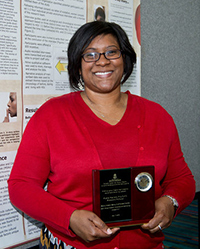Young researcher found public health in 'epiphany moment'
April 14, 2014

Alyssa Robillard was selected to receive the "Faculty Award" for
the Poster Session & Abstracts competition held in conjunction
with the James E. Clyburn
Health Disparities Lecture.
It was an "epiphany moment" that led Alyssa Robillard to the field of health promotion, education, and behavior.
Robillard was a graduate student at the University of Alabama at Birmingham School of Public Health, where she was studying environmental health, when a guest lecturer came to speak on the field of health education and behavior.
"I realized that health promotion was a fit with my interest in people," said Robillard, an associate professor in the Arnold School's Department of Health Education, Promotion, and Behavior.
Her interest in environmental health and industrial hygiene faded. "I didn't see myself working with OSHA guidelines."
Like so many other young people and adults, she wasn't aware of the many opportunities available in public health. But her parents had instilled in her a love for learning when she was growing up in Baton Rouge, La. Once she realized that public health was a career in which she would have an impact on helping other people, Robillard absorbed everything she could learn.
"I love public health. Being at the Arnold School has reinforced how important this field is," said Robillard. "I know that it is what I am supposed to do."
Her passion for her chosen field is recognized by others as well. Robillard's poster, "Cultural Narrative as a Tool in HIV Prevention: Stories of HIV-Positive African American Women," garnered the Faculty Award in the Poster Session & Abstract competition, held in conjunction with the seventh annual James E. Clyburn Health Disparities Lecture.
Her award-winning presentation showcased a study that utilized storytelling as a vehicle for African- American women to share their personal experiences of being HIV-positive. The qualitative study of 25 African-American women documented the women's individual experiences.
Stories before contracting HIV revealed the salience of "family." The women also talked about the "nature of relationships," including those that were quickly established or were abusive, and the lack of disclosure from their partners about HIV status. Rural women disclosed feelings of isolation as well as problems with confidentiality and stigma.
Many of the women, however, didn't view being HIV positive as a "death sentence," but viewed the diagnosis as a second chance or turning point in their lives, Robillard said.
"The stories reflected a strength of character among many women," she said.
Findings from this study will be used to develop an HIV prevention intervention for African-American women using cultural narrative. The research is important. According to data from the S.C. Department of Health and Environmental Control, nearly 72 percent of new adult and adolescent HIV cases in South Carolina are African American, and of these, 29 percent are black women.
In addition to her research interests of HIV prevention and sexual health, Robillard also is studying what happens when HIV-positive adults, who have been incarcerated, return to communities. "The health care and resources that are available to them are very important," she said. "What happens to them is a public health issue."
She also is studying adolescents whose mothers are incarcerated and the role of the caregiver to the well-being and future of these youth. Those with active and involved caregivers are less likely to engage in risk behaviors. "Being away from their mothers puts many of these youth at risk for unhealthy behaviors and lifestyles. Many of them may not have the presence of a father in their lives," Robillard said. "The caregiver plays a crucial role."
As she develops her research program, Robillard finds that she is drawn to her studies by "a passion … the work is inspiring."
In working with community partners who are dedicated to the health of vulnerable children and adults, Robillard said, "Their passion reminds me of why this is important."
And Robillard's own story and passion underscore the altruism that draws so many into the field of public health.



_01.jpg)
_02.jpg)